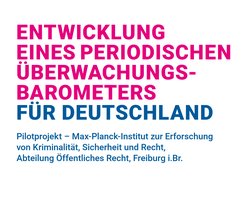Quantifying Surveillance
“Digital Dialogue” with Ralf Poscher
Ever since the German Federal Constitutional Court made clear in 2010 that there must be limits to surveillance – including government surveillance –, the scientific community has been faced with a difficult task: How can surveillance be measured, and can it be measured quantitatively? Ralf Poscher, director at the Max Planck Institute, is spearheading a research project that aims to answer precisely this question. Using the possibilities offered by digitization, the state' surveillance activities will be recorded in terms of numbers. This so-called surveillance barometer could help make government surveillance measures transparent in the long term.

In its new podcast “Digitalgespräch,” the Center Responsible Digitality (Zentrum Verantwortungsbewusste Digitalisierung – ZEVEDI) hosts Ralf Poscher, who presents his research project “Development of a periodic surveillance barometer for Germany” in detail. ZEVEDI is a research and competence network of Hessian universities that aims to combine their scientific expertise on society's digital transformation and to transfer the knowledge gained into the economy, into society, and into politics.












